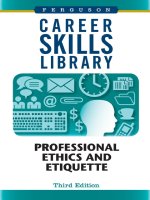Java Threads, Third Edition ppt
Bạn đang xem bản rút gọn của tài liệu. Xem và tải ngay bản đầy đủ của tài liệu tại đây (2.95 MB, 1,684 trang )
Java Threads, Third Edition
Table of Contents
Copyright
Preface
Who Should Read This Book?
Versions Used in This Book
What's New in This Edition?
Organization of This Book
Conventions Used in This Book
Code Examples
How to Contact Us
Safari Enabled
Acknowledgments
Chapter 1. Introduction to
Threads
1.1 Java Terms
1.2 About the Examples
1.3 Why Threads?
1.4 Summary
Chapter 2. Thread Creation and
Management
2.1 What Is a Thread?
2.2 Creating a Thread
2.3 The Lifecycle of a Thread
2.4 Two Approaches to
Stopping a Thread
2.5 The Runnable Interface
2.6 Threads and Objects
2.7 Summary
Chapter 3. Data
Synchronization
3.1 The Synchronized Keyword
3.2 The Volatile Keyword
3.3 More on Race Conditions
3.4 Explicit Locking
3.5 Lock Scope
3.6 Choosing a Locking
Mechanism
3.7 Nested Locks
3.8 Deadlock
3.9 Lock Fairness
3.10 Summary
Chapter 4. Thread Notification
4.1 Wait and Notify
4.2 Condition Variables
4.3 Summary
Chapter 5. Minimal
Synchronization Techniques
5.1 Can You Avoid
Synchronization?
5.2 Atomic Variables
5.3 Thread Local Variables
5.4 Summary
Chapter 6. Advanced
Synchronization Topics
6.1 Synchronization Terms
6.2 Synchronization Classes
Added in J2SE 5.0
6.3 Preventing Deadlock
6.4 Deadlock Detection
6.5 Lock Starvation
6.6 Summary
Chapter 7. Threads and Swing
7.1 Swing Threading
Restrictions
7.2 Processing on the Event-
Dispatching Thread
7.3 Using invokeLater( ) and
invokeAndWait( )
7.4 Long-Running Event
Callbacks
7.5 Summary
Chapter 8. Threads and
Collection Classes
8.1 Overview of Collection
Classes
8.2 Synchronization and
Collection Classes
8.3 The Producer/Consumer
Pattern
8.4 Using the Collection Classes
8.5 Summary
Chapter 9. Thread Scheduling
9.1 An Overview of Thread
Scheduling
9.2 Scheduling with Thread
Priorities
9.3 Popular Threading
Implementations
9.4 Summary
Chapter 10. Thread Pools
10.1 Why Thread Pools?
10.2 Executors
10.3 Using a Thread Pool
10.4 Queues and Sizes
10.5 Thread Creation
10.6 Callable Tasks and Future
Results
10.7 Single-Threaded Access
10.8 Summary
Chapter 11. Task Scheduling
11.1 Overview of Task
Scheduling
11.2 The java.util.Timer Class
11.3 The javax.swing.Timer
Class
11.4 The
ScheduledThreadPoolExecutor
Class
11.5 Summary
Chapter 12. Threads and I/O
12.1 A Traditional I/O Server
12.2 A New I/O Server
12.3 Interrupted I/O
12.4 Summary
Chapter 13. Miscellaneous
Thread Topics
13.1 Thread Groups
13.2 Threads and Java Security
13.3 Daemon Threads
13.4 Threads and Class Loading
13.5 Threads and Exception
Handling
13.6 Threads, Stacks, and
Memory Usage
13.7 Summary
Chapter 14. Thread
Performance
14.1 Overview of Performance
14.2 Synchronized Collections
14.3 Atomic Variables and
Contended Synchronization
14.4 Thread Creation and
Thread Pools
14.5 Summary
Chapter 15. Parallelizing Loops
for Multiprocessor Machines
15.1 Parallelizing a Single-
Threaded Program
15.2 Multiprocessor Scaling
15.3 Summary
Appendix A. Superseded
Threading Utilities
A.1 The BusyFlag Class
A.2 The CondVar Class
A.3 The Barrier Class
A.4 The RWLock Class
A.5 The ThreadPool Class
A.6 The JobScheduler Class
A.7 Summary
Colophon
Index
index_A
index_B
index_C
index_D
index_E
index_F
index_G
index_H
index_I
index_J
index_K
index_L
index_M
index_N
index_O
index_P
index_Q
index_R
index_S
index_T
index_U
index_V
index_W
• Table of Contents
• Index
• Reviews
• Reader Reviews
• Errata
• Academic
Java Threads, Third Edition
By Scott Oaks, Henry Wong
Publisher : O'Reilly
Pub Date : September 2004
ISBN : 0-596-00782-5
Pages : 360
Threads are essential to Java
programming, but learning to
use them effectively is a
nontrivial task. This new edition
of the classic Java Threads
shows you how to take full
advantage of Java's threading
facilities and brings you up-to-
date with the watershed
changes in Java 2 Standard
Edition version 5.0 (J2SE 5.0).
It provides a thorough, step-by-
step approach to threads
programming.
• Table of Contents
• Index
• Reviews
• Reader Reviews
• Errata
• Academic
Java Threads, Third Edition
By Scott Oaks, Henry Wong
Publisher : O'Reilly
Pub Date : September 2004
ISBN : 0-596-00782-5
Pages : 360
Copyright
Preface
Who Should Read This Book?
Versions Used in This Book
What's New in This Edition?
Organization of This Book
Conventions Used in This Book
Code Examples
How to Contact Us
Safari Enabled
Acknowledgments
Chapter 1. Introduction to Threads
Section 1.1. Java Terms
Section 1.2. About the Examples
Section 1.3. Why Threads?
Section 1.4. Summary
Chapter 2. Thread Creation and Management
Section 2.1. What Is a Thread?
Section 2.2. Creating a Thread
Section 2.3. The Lifecycle of a Thread
Section 2.4. Two Approaches to Stopping a
Thread
Section 2.5. The Runnable Interface
Section 2.6. Threads and Objects
Section 2.7. Summary
Chapter 3. Data Synchronization
Section 3.1. The Synchronized Keyword
Section 3.2. The Volatile Keyword
Section 3.3. More on Race Conditions
Section 3.4. Explicit Locking
Section 3.5. Lock Scope
Section 3.6. Choosing a Locking Mechanism
Section 3.7. Nested Locks
Section 3.8. Deadlock
Section 3.9. Lock Fairness
Section 3.10. Summary
Chapter 4. Thread Notification
Section 4.1. Wait and Notify
Section 4.2. Condition Variables
Section 4.3. Summary
Chapter 5. Minimal Synchronization
Techniques
Section 5.1. Can You Avoid
Synchronization?
Section 5.2. Atomic Variables
Section 5.3. Thread Local Variables
Section 5.4. Summary
Chapter 6. Advanced Synchronization Topics
Section 6.1. Synchronization Terms
Section 6.2. Synchronization Classes Added
in J2SE 5.0
Section 6.3. Preventing Deadlock
Section 6.4. Deadlock Detection
Section 6.5. Lock Starvation
Section 6.6. Summary
Chapter 7. Threads and Swing
Section 7.1. Swing Threading Restrictions
Section 7.2. Processing on the Event-
Dispatching Thread
Section 7.3. Using invokeLater( ) and
invokeAndWait( )
Section 7.4. Long-Running Event Callbacks
Section 7.5. Summary
Chapter 8. Threads and Collection Classes
Section 8.1. Overview of Collection Classes
Section 8.2. Synchronization and Collection
Classes
Section 8.3. The Producer/Consumer Pattern
Section 8.4. Using the Collection Classes
Section 8.5. Summary
Chapter 9. Thread Scheduling
Section 9.1. An Overview of Thread
Scheduling
Section 9.2. Scheduling with Thread
Priorities
Section 9.3. Popular Threading
Implementations
Section 9.4. Summary
Chapter 10. Thread Pools
Section 10.1. Why Thread Pools?
Section 10.2. Executors
Section 10.3. Using a Thread Pool
Section 10.4. Queues and Sizes
Section 10.5. Thread Creation
Section 10.6. Callable Tasks and Future
Results
Section 10.7. Single-Threaded Access
Section 10.8. Summary
Chapter 11. Task Scheduling
Section 11.1. Overview of Task Scheduling
Section 11.2. The java.util.Timer Class
Section 11.3. The javax.swing.Timer Class
Section 11.4. The
ScheduledThreadPoolExecutor Class
Section 11.5. Summary
Chapter 12. Threads and I/O
Section 12.1. A Traditional I/O Server
Section 12.2. A New I/O Server
Section 12.3. Interrupted I/O
Section 12.4. Summary
Chapter 13. Miscellaneous Thread Topics
Section 13.1. Thread Groups
Section 13.2. Threads and Java Security
Section 13.3. Daemon Threads
Section 13.4. Threads and Class Loading
Section 13.5. Threads and Exception
Handling
Section 13.6. Threads, Stacks, and Memory
Usage
Section 13.7. Summary
Chapter 14. Thread Performance
Section 14.1. Overview of Performance
Section 14.2. Synchronized Collections
Section 14.3. Atomic Variables and
Contended Synchronization
Section 14.4. Thread Creation and Thread
Pools
Section 14.5. Summary
Chapter 15. Parallelizing Loops for
Multiprocessor Machines
Section 15.1. Parallelizing a Single-Threaded
Program
Section 15.2. Multiprocessor Scaling
Section 15.3. Summary
Appendix A. Superseded Threading Utilities
Section A.1. The BusyFlag Class
Section A.2. The CondVar Class
Section A.3. The Barrier Class
Section A.4. The RWLock Class
Section A.5. The ThreadPool Class
Section A.6. The JobScheduler Class
Section A.7. Summary
Colophon
Index









